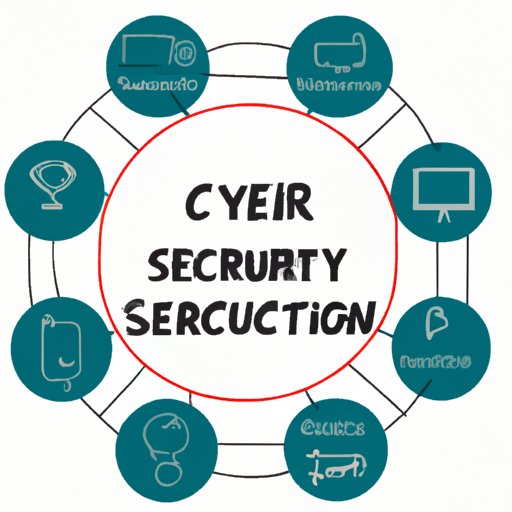Introduction
Cyber security is the practice of protecting networks, systems, and programs from digital attacks. These attacks are usually aimed at accessing, changing, or destroying sensitive information, extorting money from users, or interrupting normal business processes. As technology becomes increasingly pervasive and our reliance on it grows, so does the need for skilled cyber security professionals who can identify and mitigate these threats.
Problem Statement
So, you’re interested in getting into cyber security but you’re not sure where to start? There are many different paths you can take depending on your particular interests and skills. This article will provide an overview of how to get started in cyber security, from researching roles to developing skills to participating in competitions.

Research Different Cyber Security Roles and Identify Which Interests You Most
A great place to begin is by researching the various roles available in cyber security. This will give you an understanding of the types of positions and the qualifications and skills you need to succeed in each one. Here are some of the most common roles in cyber security:
Types of Roles
- Security Analysts: Analyze data to identify potential threats, develop countermeasures and monitor system performance.
- Network Architects: Design, implement and maintain secure network infrastructure.
- Incident Responders: Investigate security breaches and respond to incidents.
- Forensic Investigators: Collect data from computers and other digital devices in order to investigate cybercrimes.
- Penetration Testers: Test networks for vulnerabilities and weaknesses.
Benefits of Each Role
Each role offers its own unique benefits and challenges. Security analysts, for example, must possess strong analytical and problem-solving skills as well as knowledge of security protocols and monitoring techniques. Network architects must have a comprehensive understanding of networking concepts, while incident responders must be able to think on their feet and handle stressful situations. Forensic investigators and penetration testers need technical expertise and a good eye for detail.
Resources to Research Cyber Security Roles
There are plenty of resources available to help you research cyber security roles. The National Initiative for Cybersecurity Careers and Studies (NICCS) provides an extensive list of job descriptions and requirements for each role. The SANS Institute also has an informative website that outlines different cyber security positions and their responsibilities. Additionally, the US Department of Homeland Security’s website provides detailed information about the various roles and responsibilities in the field of cyber security.
Develop a Basic Understanding of Computer Networks and Systems
Once you’ve identified the role that interests you most, the next step is to develop a basic understanding of computer networks and systems. Knowing the fundamentals of networking will enable you to design, implement and maintain secure networks, while understanding operating systems will give you the knowledge to troubleshoot any issues that may arise.
Overview of Networking Concepts
Networking involves connecting multiple computers and devices together in order to share data and resources. It relies on a variety of protocols, such as TCP/IP, which define how data is sent and received across a network. The most common type of network is a Local Area Network (LAN), which is used to connect computers in a single office or location. Wide Area Networks (WANs) are used to connect remote offices, while the Internet is a global network of interconnected networks.
Types of Networking Protocols
Networking protocols are the rules that govern how data is transmitted over a network. The two most commonly used protocols are Transmission Control Protocol (TCP) and Internet Protocol (IP). TCP is responsible for breaking down data into packets, while IP is responsible for routing those packets to their destination. Other protocols include File Transfer Protocol (FTP), Simple Mail Transfer Protocol (SMTP), and Hypertext Transfer Protocol (HTTP).
Understanding of Operating Systems
Operating systems are the software that control computer hardware and manage the resources of a computer. The most popular operating systems are Microsoft Windows, Apple macOS, and Linux. Each operating system has its own set of features and capabilities, so it’s important to gain an understanding of the differences between them. Knowing how to use the command line interface is also helpful when troubleshooting issues.
Sources for Network and System Learning
There are numerous resources available to learn more about networks and systems. The CompTIA Network+ certification is a great way to get started, as it covers the basics of networking and provides hands-on experience. If you’re looking for more in-depth knowledge, there are a variety of online courses and tutorials available. Additionally, books such as “The TCP/IP Guide” and “Linux Pocket Guide” provide comprehensive coverage of networking and systems topics.

Learn the Basics of Computer Programming and Scripting Languages
Programming is an essential skill for anyone working in cyber security. Knowing how to write code and scripts can help you automate tasks, develop custom tools and better understand applications and systems. Even if you don’t plan on becoming a programmer, having a basic understanding of programming principles can help you better troubleshoot and debug issues.
Introduction to Programming Principles
Programming involves writing instructions in a language that a computer can understand. These instructions tell the computer what to do and how to do it. Programming languages are divided into two categories: high-level languages such as C++, Java, and Python, and low-level languages such as assembly and machine code. High-level languages are easier to read and write, while low-level languages are closer to the hardware and require more advanced skills to use.
Popular Programming Languages
When it comes to cyber security, the most popular programming languages are Python, JavaScript, and C/C++. Python is an interpreted language that’s easy to learn and versatile enough to be used for a variety of tasks. JavaScript is a scripting language that’s used to create interactive web pages. C/C++ is a powerful language that’s used to develop desktop applications and embedded systems.
Advantages of Knowing Programming
Knowing how to program can give you an edge in the cyber security field. With programming skills, you can create custom tools and scripts to automate tedious tasks, such as scanning for vulnerabilities or analyzing log files. You can also better understand the inner workings of an application or system, which can help you identify potential flaws or weaknesses.
Sources for Programming Education
There are plenty of resources available to learn programming. Codecademy and Coursera offer free online courses, while sites like Udemy and Pluralsight offer paid courses. Books such as “Head First Java” and “Python Crash Course” are great for beginners, while more experienced programmers can benefit from reading “The C++ Programming Language” and “JavaScript: The Good Parts”. Additionally, open source projects on GitHub are a great way to learn by doing.
Create a Professional Network in the Cyber Security Industry
Having a strong network of peers and mentors can be invaluable when starting out in cyber security. Networking events, conferences, and hackathons are great opportunities to meet people in the industry and make valuable connections.
Joining Professional Organizations
Professional organizations such as the Information Systems Security Association (ISSA) and the International Information System Security Certification Consortium (ISC2) provide members with access to educational materials, industry news, and job postings. They also host local and virtual events that allow members to network and learn from industry experts.
Connecting with Peers Online
Online communities such as Reddit, Stack Exchange, and Slack are great places to connect with other cyber security professionals. These platforms provide a wealth of information and resources, and they’re also a great way to ask questions and get feedback from experienced practitioners.
Participating in Conferences and Events
Conferences and events such as Black Hat, DEF CON, and ShmooCon are great opportunities to meet people in the industry and learn from experts. They also provide the chance to showcase your skills and find potential employers. Additionally, hackathons are excellent ways to hone your hacking skills in a competitive environment.

Earn Relevant Certifications or Degrees in Cybersecurity
Earning certifications and degrees can give you an edge when applying for jobs in the cyber security field. Certifications demonstrate your knowledge and skills, while degrees provide a more comprehensive education. Here are some popular certifications and degrees in cyber security.
List of Popular Certifications
- CompTIA Security+: Covers topics such as cryptography, risk management, and identity management.
- GIAC Security Essentials (GSEC): Validates your knowledge of security principles and practices.
- Certified Ethical Hacker (CEH): Demonstrates your ability to identify and exploit vulnerabilities in networks and systems.
- Certified Information Systems Security Professional (CISSP): Proves your proficiency in designing and managing security programs.
Benefits of Certifications
Certifications are a great way to demonstrate your knowledge and skills to potential employers. Additionally, they often come with perks such as discounts on training courses and access to exclusive job postings. They can also give you an edge when applying for higher-level positions.
Resources to Achieve Certification
There are numerous resources available to help you prepare for certification exams. For example, CompTIA offers practice tests and study guides for its Security+ certification, while Pearson VUE provides exam preparation tips and sample questions for the CISSP exam. Additionally, websites such as Prepaway and ExamSnap offer practice exams and test dumps for a variety of certification exams.
Pursuing Higher Education
If you’re looking for a more comprehensive education in cyber security, then a degree program may be the right choice for you. Degree programs such as the Bachelor of Science in Cyber Security or the Master of Science in Information Security provide students with an in-depth understanding of security principles and technologies. Additionally, these programs often include internships and job placement assistance.
Take Advantage of Free Online Resources to Improve Your Skills
The internet is full of free resources that can help you stay up-to-date on the latest trends and technologies in cyber security. Here are some of the best sources for free cyber security training.
Tutorials, Videos and Blogs
Websites such as YouTube and TED Talks offer a wealth of educational videos and talks on cyber security topics. Additionally, blogs such as Krebs on Security and Dark Reading provide up-to-date news and insights on the latest trends and developments in the industry. Finally, tutorial sites such as Tutorials Point and Code Academy offer step-by-step guides to help you learn programming languages and other cyber security topics.
Free Training Courses
There are many free online courses available to help you learn cyber security. Sites such as Cybrary, Udemy, and Coursera offer courses on topics such as ethical hacking, network security, and cryptography. Additionally, the US government’s Cyber Aces program provides free training courses for individuals interested in pursuing a career in cyber security.
Online Communities
Online communities such as Reddit, Stack Exchange, and Slack are great places to connect with other cyber security professionals and get feedback on your work. Additionally, websites such as GitHub and SourceForge provide open source projects that can be used to hone your programming and hacking skills.

Participate in Cyber Security Competitions and Hackathons
Competitions and hackathons are great ways to challenge yourself and show off your skills. Participating in these events can help you learn new techniques, develop your problem-solving skills, and make valuable connections. Here are some of the most popular cyber security competitions and hackathons.
Benefits of Competition Participation
Competitions and hackathons provide a great opportunity to demonstrate your skills and stand out from the crowd. Additionally, these events often come with prizes, such as cash awards or scholarships, which can be helpful for furthering your education or launching your career. Finally, participating in competitions can help you build relationships with industry professionals who can serve as mentors and provide valuable insight into the field.
Types of Competitions and Hackathons
The most popular type of competition is the Capture the Flag (CTF) event, which involves solving security challenges and exploiting vulnerabilities. Other competitions include reverse engineering, malware analysis, and cryptography. Hackathons involve teams of hackers competing to find and exploit security flaws in a given system or application.
Finding Opportunities
Finding competitions and hackathons to participate in can be challenging, but there are several resources available to help. CTFTime is a great site for finding CTF events, while Hackathon.io is a great resource for locating hackathons. Additionally, websites such as Eventbrite and Meetup are great places to search for local events.
Conclusion
Summary of Key Points
Getting started in cyber security can seem daunting, but with the right guidance and resources, it doesn’t have to be. Begin by researching the different roles available in the industry and identifying which one interests you most. Then, develop a basic understanding of computer networks and systems and learn the basics of computer programming and scripting languages. Create a professional network in the industry and pursue relevant certifications or degrees. Take advantage of free online resources to improve your skills and participate in cyber security competitions and hackathons.
(Note: Is this article not meeting your expectations? Do you have knowledge or insights to share? Unlock new opportunities and expand your reach by joining our authors team. Click Registration to join us and share your expertise with our readers.)
